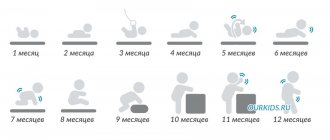What is the mode for?
I’ll say right away: modern pediatricians support the opinion of their foreign colleagues about a free schedule for feeding, sleeping, hygiene procedures and walks with the newborn. But the child is different: one can be calm, eat enough in one sitting, sleep a lot and love to swim, while the other can be capricious all day, keep up with the breast and organize concerts in the bathtub. The second option is very exhausting, especially if the mother has not given up working and is engaged in some kind of part-time work, for example, on the Internet. Let's figure out whether it's worth starting to establish a newborn's daily routine at 2 months, and how best to do it.
We humans belong to the class of mammals. But not a single animal sleeps or eats according to a schedule. They go to bed when they want, eat when they find something edible, and lick themselves when they get dirty. It turns out that the regime is not a biological need. It was invented by the people themselves. So why do we need a specific daily routine? And it is needed to make it easier for everyone to fulfill their social functions: after the birth of a baby, his father does not quit his permanent job, older brothers or sisters do not leave kindergarten or school. And if you stop caring for them, they will be hungry, unkempt and lonely. And this is in addition to the constant lack of sleep.
But when the youngest member of the family, thanks to the established daily routine, gives you the opportunity to do household chores, then you will rest (though it will be an active holiday), pay a little attention to your household and make time for yourself.
There are a few more advantages:
- sleep and feeding of a newborn baby can be predicted over time;
- with the established regime, it will be possible to think about how best to organize the home life of the remaining family members;
- you will know for sure that the baby has eaten enough, in contrast to frequent inadequate feedings;
- the daily routine (possibly partially) will remain the same even if the baby is ill;
- According to statistics, children raised with a correct daily routine are less likely to get sick and grow up calm and punctual;
- By organizing your child’s life, you yourself will become more disciplined.
How to set the mode
Most likely it will not be easy, and you will have to show diligence and patience. And if you are persistent, you will succeed. To begin with, it is worth observing the baby for 1-2 weeks, scrupulously recording the time of hunger, the onset and duration of sleep and wakefulness. Then all that remains is to conduct a comparative analysis of the records and sketch out an approximate schedule. And note: this schedule was dictated by the baby himself.
Daily routine at 2 months: feeding
The most difficult moment is establishing the diet of a breastfed baby at 2 months. After all, the timing of famine depends not only on the quantity of milk, but also on its quality. Here we can also talk about colic associated with a violation of the nursing mother’s diet: the baby will be capricious, and you, considering him hungry, will breastfeed him again and again. Therefore, before you begin to establish a feeding regimen for your baby, adjust your diet while breastfeeding.
It will be easier with formula: you always know how much the child eats, and you can safely feed him on a schedule. The approximate interval between feedings with breast milk is 3.5 hours, with formula - 4 hours (they take longer to digest). But it may happen that the baby begins to look for the breast much earlier than this. Perhaps he's just thirsty. Try giving him some water, fennel or chamomile tea, dill water (without sugar).
It happens, on the contrary, that a baby sleeps longer than usual and risks missing the set time. In this case, it is recommended to try feeding him when he is sleepy or gently waking him up by picking him up, gently touching his nose, or tapping his cheek or chin with your finger. Normally, a two-month-old baby consumes 800-900 ml of mother's milk or 750-800 ml of formula per day. When entering the daily routine, the indicated portions are divided into 6 meals: 1 night and 5 daytime. But if the baby insists, the volume of food can be divided into 8 parts: 2 night meals and 6 day meals. The duration of one feeding is 15-20 minutes.
If you suspect malnutrition, count the frequency of urination: there should be 10-15 per day. You can also navigate by the frequency of bowel movements: in a two-month newborn this event occurs 2-4 times a day.
Did you know? Modern pediatricians say that the baby goes to the breast not only in search of food. This way he is convinced of his safety and enjoys closeness with his mother. It has been established that breast milk and nipple skin smell like amniotic fluid. In addition to warm maternal hugs, they remind the child of that carefree intrauterine life.
So, if you have plenty of time and worthy helpers, enjoy close contact with the baby and forget about the daily routine.
About the daily routine of an artificial baby
The daily routine of a 2-month-old baby fed with artificial formula will be slightly different than for a baby receiving breast milk. This is explained by the longer (compared to breast milk) absorption of the artificial product . In this regard, the breaks between feedings should be at least four hours, so the artificial feeding schedule will be as follows: 6:00 | 10:00 | 14:00 | 18:00 | 22:00 | 2:00
As for the periods of wakefulness and sleep, they remain the same as for infants feeding on mother's milk. Depending on the individual characteristics of each child’s body, some minor adjustments may be made to this regimen.
Sleep and wakefulness
The duration of sleep and wakefulness in a baby depends on a lot of reasons, starting with the course of pregnancy in his mother. Threats of miscarriage, increased uterine tone, bad habits, premature birth or pathological labor, medical procedures performed on the newborn can affect both their duration and frequency. Moreover, there is no clear pattern: some babies sleep soundly and for a long time, while others sleep for 15 minutes, waking up from any rustle, and then cannot fall asleep.
If everything is more or less normal with the child, then the wrong temperature in the room (below 20°C or above 25°C), air humidity, loud noises, bright lights, an uncomfortable pillow or folds in the sheets can disrupt the sleep and wakefulness pattern. A hungry newborn will also not sleep for long, nor will an overfed one.
Baby's sleep schedule at 2 months
In many sources you can find reassuring figures: a two-month-old baby sleeps up to 16 hours out of 24, and even separately from his mother. Don’t believe it, these are echoes of Soviet textbooks on pediatrics, the editions of which have already been revised several times. And modern newborns have changed dramatically.
It has already been proven that shallow (REM) sleep predominates in children at this age. Their deep, dreamless sleep lasts about half an hour. The baby falls asleep easier and faster under the warm and tasty mother's breast. But until the deep sleep phase arrives, he will sensitively react to the “undocking” and wakes up.
Throughout the day, a two-month-old baby sleeps up to 6 times, 2 of them for longer periods (up to 2 hours), and the remaining 4 times for half an hour or up to 40 minutes. And in order to gradually regulate the sleep pattern, the baby should be placed in the same place, without changing the direction of the foot and head ends. It is also advisable to stick to the same time. Every time before going to bed, it is necessary to create conditions favorable for falling asleep:
- ventilate the children's room;
- close the curtains, creating twilight in the room;
- protect the newborn from noise, including from a working TV;
- avoid unnecessary activity;
- change into a clean diaper;
- wear pajamas made of natural fabric;
- place the newborn in a prepared crib with sheets spread out on a hard mattress, a low pillow and soft sides.
Doctors and young mothers have come up with many tricks to help your child fall asleep faster and get a longer night's sleep. Even computer geniuses (most likely young fathers) tried. Lulling techniques are called rituals. They are given at least half an hour. Here are some of them:
- bathing in a bath in herbs (remember, medicinal herbs can only be used 1-2 times a week);
- light massage after bathing;
- a gentle, quiet lullaby;
- —swaddling—;
- calm music of a hanging toy - mobile;
- stroking the back of the head, back, and back of the legs;
- electronic white noise.
Why do children change the time of day?
A baby can change from day to night:
- for any pain that worsens at night;
- lack of comfort during sleep;
- with increased excitability of the nervous system;
- after active games before falling asleep;
- during long daytime sleep.
By eliminating these causes, you can also improve your ability to fall asleep at night. If you cannot cope on your own, consult a pediatrician. And don't be shy - it's their job. And sleepless nights harm the entire family.
Features of feeding
The ideal option for the proper development of the baby is breastfeeding, since mother's milk is perfectly absorbed by the child's body, contains all the necessary nutrients and antibodies that protect the child from the effects of pathogenic microorganisms.
The nuances of breastfeeding
The most physiological is considered to be a free breastfeeding regime, when the baby gets access to mother's milk “on demand.” Demanding crying or fussiness from your baby are signs that your baby is hungry. .
Despite the seeming spontaneity of this approach, it turned out that the baby needs to eat every three hours during the day and four at night, so this completely coincides with the daily routine recommended by modern pediatricians.
This is exactly the feeding regimen that most experienced mothers practice, arguing that it not only satisfies the psychological and physiological needs of the baby, but also minimizes the risk of milk stagnation (lactostasis). Babies who receive breastfeeding on demand practically do not cry, because they feel not only fullness, but also a state of serenity and comfort, close to what they experienced during intrauterine development.
The daily requirement of breast milk for a two-month-old baby is approximately 900 ml (single dose - 130 ml). How to monitor whether the baby is receiving the required amount? The length of time it stays at the breast can serve as a guide . The average duration of one feeding is twenty minutes (the most active and strong infants are able to get enough in a quarter of an hour). Read in detail about how much breast milk or formula a baby should eat -
There are children who turn away from the breast after just five minutes. This moment is clearly not enough to saturate the child. This is usually done by weakened infants who feed exclusively on “light” milk, which enters their mouths without the slightest effort on their part. When this “feed” stops, they stop sucking. To get the little sloth to eat properly, experts recommend that mothers express the first portion of milk. Then the baby will suck exactly as much as he is supposed to .
However, with this feeding option, the baby may experience a lack of fluid, since the “front” milk contains more liquid, and the “hind” milk contains more fat. To eliminate the possibility of such an imbalance, the mother should consult a pediatrician - he will help her choose the necessary feeding tactics.
It is also undesirable to hold the baby at the breast for too long. For some babies, feeding takes about an hour. After eating for the first twenty minutes, they simply hold the nipple in their mouth, occasionally sucking on it. Mothers of such babies should be aware that this can affect the condition of the nipples.
Due to constant mechanical stress, cracks can form on them, which can cause extremely painful sensations during each feeding. To prevent this, you should carefully remove the nipple from the mouth of an already saturated baby.
Another indicator of the sufficiency of breastfeeding is the number of wet diapers and diapers soiled by the baby . A two-month-old baby, receiving a sufficient amount of mother's milk, urinates 12 to 15 times a day. The stool pattern may vary. Some babies poop after each feeding, others have stool from two to four times a day: this is also considered the norm (brother-fed babies do this less often - no more than one or two times a day).
Read also: important tips for mothers on proper breastfeeding
About feeding artificial animals
Formula-fed babies are fed only at certain hours. This is a necessary measure due to the fact that it takes more time to digest artificial formula, which, although it is an analogue of mother’s milk, is slightly different from it in composition and beneficial properties.
Two-month-old infants are fed with adapted milk formula number 1. The number of feedings (5-6 times) and the volume of one serving (120-140 ml) is indicated on each package. It is not recommended to exceed the indicated dosage and number of feedings. Premature babies and very low birth weight infants are on a special feeding regimen, which is monitored and prescribed by a pediatrician.
If during breastfeeding the baby is given drinking water only on especially hot days - to quench his thirst (mother's milk is both drink and food for him), then for artificial babies it is absolutely necessary. Drinking water must be provided to artificially-fed babies during pauses between feedings. .
[sc:rsa]
Despite the fact that artificial babies are fed from a bottle, mothers should feed them not in the crib, but by holding them in their arms: this is how much-needed physical contact is achieved with the person they love most.
After feeding babies (both infants and artificial babies), it is necessary to hold them in an upright position for three minutes, allowing the portion of air that has entered the stomach to leave it. The presence of profuse (“fountain”) belching is a reason to contact a pediatrician, since this may indicate certain pathologies of the gastrointestinal tract.
Baby's waking hours at 2 months
The recommended interval between sleeps is no more than 2 hours. During this time, the children manage to get tired enough to then fall asleep peacefully. In no case should you exceed the period of wakefulness, despite the child’s stubbornness: overwork leads to poor falling asleep and sleep disturbances.
Waking time is allocated for feeding the baby, caring for him, games, gymnastics and massage. But if the child sleeps very little or falls asleep for a long time (more than 20 minutes), the intervals between sleeps should be reduced. In the third month after birth, you will already recognize signs that the baby is tired and wants to sleep:
- he becomes lethargic and inactive;
- responds slowly to toys or sounds;
- his gaze becomes glassy;
- not interested in games;
- tugs at the earlobe with her fingers;
- asks for a pacifier, breast or bottle;
- requires you to pull yourself together.
But when a child rubs his eyes, is capricious or throws tantrums, know: he is already overtired.
What to do with such a baby while he is awake so that it is beneficial? After the child is 2 months old, it is necessary to begin developing visual and auditory perception through games with bright toys. The duration of games should not exceed 10 minutes per session.
- Taking into account physiological farsightedness, you need to move toys to the sides at a distance of at least half a meter. In this case, the baby can lie on his back, but it is better to lay him on his tummy: this will make it even easier for him to follow objects, and at the same time the spine and arms will be strengthened.
- If you have some urgent short-term business waiting for you, and the baby is at the peak of wakefulness, try putting him in the crib and having a hanging mobile or hanging colored inflatable balls around the perimeter.
- For the development of the auditory analyzer, the same mobile phone or rattles with different sounds (but not very loud), light music, talking with the baby, singing nursery rhymes to him are suitable.
- Don't forget about the psychological aspect. Smile at your baby more often: at 2 months, he will readily smile back and even try to “speak.”
Features of wakefulness
Two-month-old babies show interest in the things and people around them. During this period, the child’s need to wake up is associated not only with hunger and discomfort. The baby also learns little by little to control muscles, sees and hears better. Therefore, the daily routine should include more time for leisure.
Walks
The baby needs daily long walks (1.5-2 hours at a time) in the fresh air. Ideally, there should be 2-3 such walks per day in good weather. The best time to go is in the morning before 11:00 and in the evening after 16:00. The baby's skin should not be exposed to direct sunlight all the time, and in winter you should not go out if it is -10 or below.
If the baby does not sleep during a walk, periodically take him out of the stroller and show him what is around. Don't forget to talk and tell him about everything you focus his attention on.
Gymnastics and massage
The baby needs touching manipulation and physical exercise for better development of muscles and joints. It is advisable to choose a morning time for gymnastics. What do we have to do:
- put the baby on his back, taking turns, and then simultaneously raising and lowering his arms and legs;
- spread your arms and bring them together, crossing them on your chest;
- raise your left and right arms up alternately;
- stretch your arms forward like boxing;
- supporting the armpits in a vertical position, lifting and lowering onto the crib, but under no circumstances placing it down; it is too early to put pressure on the legs;
- imitate the movement of a bicycle with your legs (pedal);
- bend your knees and pull them towards your stomach.
It is important to do all of the above manipulations slowly and carefully.
To get rid of gases, it is also good to do a simple massage - the child lies on his back, his legs are bent at the knees, and the tummy is stroked clockwise for several minutes. To improve digestion, place the baby on his stomach 3 times a day, stroking his back, arms, legs, and buttocks.
Bathing
Water hygiene procedures require following a few simple rules:
- special detergents are allowed a maximum of 1 time per week;
- daily bathing takes place in ordinary clean water at a temperature of 37 degrees, without shampoo, soap, etc.;
- if a baby has prickly heat, an infusion of string and chamomile is added to the water;
- It is not necessary to bathe the baby before going to bed (washing as necessary);
- The bathing time is selected individually, if the child is capricious at the time you choose.
To care for a newborn, it is advisable to have on hand a special anti-dry skin powder that can be used after bathing and wiping dry.
Walks
The baby should be in the fresh air every day. You can, of course, leave him to sleep in a stroller on his own balcony or in a private yard. But to benefit you, be sure to go for walks in non-polluted areas. With a stroller, you can do intense walking and lose the pounds you gained during pregnancy. Moreover, increased oxygenation of your body will promote lactation.
A two-month-old baby needs to be outside the home for a total of up to 4 hours a day. The main condition is that you need to dress your baby according to the weather - a little warmer than yourself. There are also climatic restrictions: do not go outside in the midday heat or frost below - 15°C, and in high humidity be extremely attentive to the condition of the baby. When establishing a daily routine, it is also advisable to do walks at the same time.
Dream
Sleep is a very important routine moment in a baby’s life. It takes up a significant portion of the day.
In just one day, the duration of sleep for a two-month-old baby can be up to 18 hours. The duration of one daytime nap ranges from 40 minutes to 2 hours. During this time, the small body has time to rest and recover. The intervals of night sleep gradually, as they grow older, become longer and longer due to the decrease in periods of daytime sleep.
Falling asleep
The process of falling asleep occurs best in those children whose mothers practice breastfeeding. Artificial babies have to be rocked to sleep if they cannot fall asleep on their own. Soviet pediatrics did not recommend rocking babies, hoping to instill independence in them. But it is no coincidence that from time immemorial all peoples have used such a wonderful invention as the cradle or shaky. At the present stage, rocking a baby is not only not prohibited, but is also recommended by pediatricians and child psychologists.
Clean, fresh air is of great importance for falling asleep. Do not forget to ventilate the room in which the baby sleeps.
Wakefulness
Periods of wakefulness will gradually begin to occupy less time than sleep. Over the course of the year, this ratio will change in favor of vigorous activity.
During the daytime, from waking up to falling asleep, it is best to conduct developmental activities and exercises.
Hygiene procedures
- You need to wash your face every morning.
- Wash your mouth after every feeding.
- Clean the nose as needed.
- Wash your baby and take care of folds every time you change the diaper.
- It is better not to clean the external auditory canals: the wax will come out on its own, when the time comes, you just need to remove it.
- It is better to bathe and treat the navel in the evening before bed. If your navel gets wet, you will have to dry it more often.
Disturbances in the daily routine of a 2 month old baby
Until you have established a regime, there can be no talk of violating it. The main thing is to adhere to the timing of sleep, the amount of feeding, and the time spent in the fresh air. At the same time, with gentle persistence you need to accustom your child to a certain routine. Usually the daily routine is established within 2 weeks, although there are exceptions.
Even established routines can be disrupted when a newborn is ill. You will have to feed him on demand and spend sleepless nights with him. But you shouldn’t cancel your walks: as soon as the temperature returns to normal, you need to go out into the fresh air more often, especially if the illness is related to the respiratory system!
Child care and walks
An integral part of the 2-month regimen is hygiene measures and walks. You can walk with a two-month-old baby for a long time, since at this age children sleep well outside and can go without feeding for 2-3 hours. It is better to split the walks into 2 times of 1.5-2 hours, but in bad weather conditions you can limit yourself to one two-hour walk. At this time, it is good to be close to home so that you can quickly feed or change the baby if necessary.
Among hygienic and hardening procedures, pediatricians especially highlight bathing. It is best to bathe your baby before going to bed, but there are children who, after water procedures, remain in an excited state for a long time and cannot fall asleep. It is better to bathe such babies during the daytime. The duration of the procedure should not exceed 10-15 minutes - longer bathing will tire the baby, and he may fall asleep before he eats the required amount of milk, which will lead to disruption of night sleep.
In native mode
If even after a month you have not been able to accustom your baby to a daily routine, then you will have to come to terms with his own routine. It will be difficult, and the help of your loved ones will not hurt you. Try to return to establishing a daily routine in a month, when the baby is stronger and you can accustom him to the routine in a new way.
Video: tricks of other mothers
If you can’t figure out how to lull your baby to sleep in a timely manner, advice from other mothers will help you. Watch a short video, maybe something will suit you too.
Many doctors recommend starting to establish a daily routine from the age of three months. But if your baby is ready to live according to a schedule, you will understand this by carefully observing his habits. You cannot force a routine. It is better to postpone this system than to break the psyche of your child.
Do you think such a baby needs a daily routine? Justify - why? To do this, share your opinion in the comments.











